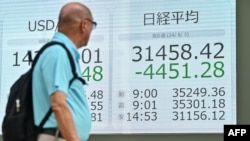Japanese stock markets plummeted Monday, with Japan’s Nikkei 225 index suffering its largest single-day point drop in history, driven by fears of a strengthening yen and a possible recession in the United States.
In a sell-off that was mirrored in markets throughout Asia, the Nikkei ended the day down a staggering 12.4% – drawing comparisons to the “Black Monday” stock market crash of 1987.
Trading in Japan was suspended to prevent panic selling after the decline triggered circuit breakers designed to contain severe market drops. The frenzy also activated circuit breakers in South Korea, where the main market finished nearly 9% lower.
In Taiwan, stocks plunged more than 8% – the worst single-day percentage drop in the island’s history. Shares of Taiwan Semiconductor Manufacturing Company — the world's largest chipmaker – fell nearly 10%.
European markets also declined sharply at the start of trading. U.S. stock futures also fell, an indication that the volatility will continue in U.S. markets on Monday.
The sell-off was a continuation from Friday, when the United States posted a worse than expected jobs report. Some investors are also concerned that the U.S. Federal Reserve may have acted too slowly in lowering interest rates that have been elevated in an attempt to reduce inflation.
Another worry is geopolitical tensions in the Middle East, after last week’s assassination of Ismail Haniyeah, Hamas’ top political leader in Tehran. Iran, which has blamed Israel for the attack, has vowed retaliation, raising fears of a regional war.
The crash has been most severe in Japan, which analysts said was experiencing a market correction after many investors relied on a historically cheap yen and rock-bottom interest rates to fund risky investments. That strategy was exposed after Japan last week raised benchmark interest rates for only the second time in 17 years and hinted that such rate hikes may continue.
“I don’t think it’s a civilization-altering crash,” said Khoon Goh, head of Asia research at ANZ Research. “It’s just to me a simple case of market participants getting way ahead and, I guess you can argue, greedy, in over-leveraging, thinking that cheap and free money in Japan was going to be here to stay. And that has gone badly wrong, and they are having to very quickly unwind it and it’s having knock-on effects into asset markets.”
In an interview with VOA, Goh downplayed concerns about a U.S. recession.
“I think it’s a little bit unfair to blame the (U.S.) Fed for being late or behind the curve, because until recently a lot of people were thinking that the U.S. economy was still in reasonably good shape. And no one was really ringing the recession alarm bells,” he said.
Last week, the U.S. Federal Reserve chose to hold interest rates steady, even while leaving the door open for a rate cut next month.
Two years ago, the Fed started increasing borrowing costs to curb inflation, which had caused prices to soar for essentials like rent and food. Since then, it has aimed for a "soft landing," seeking to control inflation without causing an economic recession.
In an analytical note, economists at Goldman Sachs increased the probability of a U.S. recession within the next 12 months from 15% to 25%, although they acknowledged that the risk remains limited given the tools available to the U.S. Federal Reserve.
“The Fed has significant firepower, and can cut rates quite aggressively to support growth if needed,” added a commentary published Monday by BMI – A Fitch Solutions Company.
However, while global markets have been more volatile than expected, they had recently rallied sharply and were vulnerable to a sell-off, according to BMI.
“Corrections of 5-10% are fairly common during bull markets and typically, there is a seasonal pick up in equity volatility during the July-October period,” it added.











